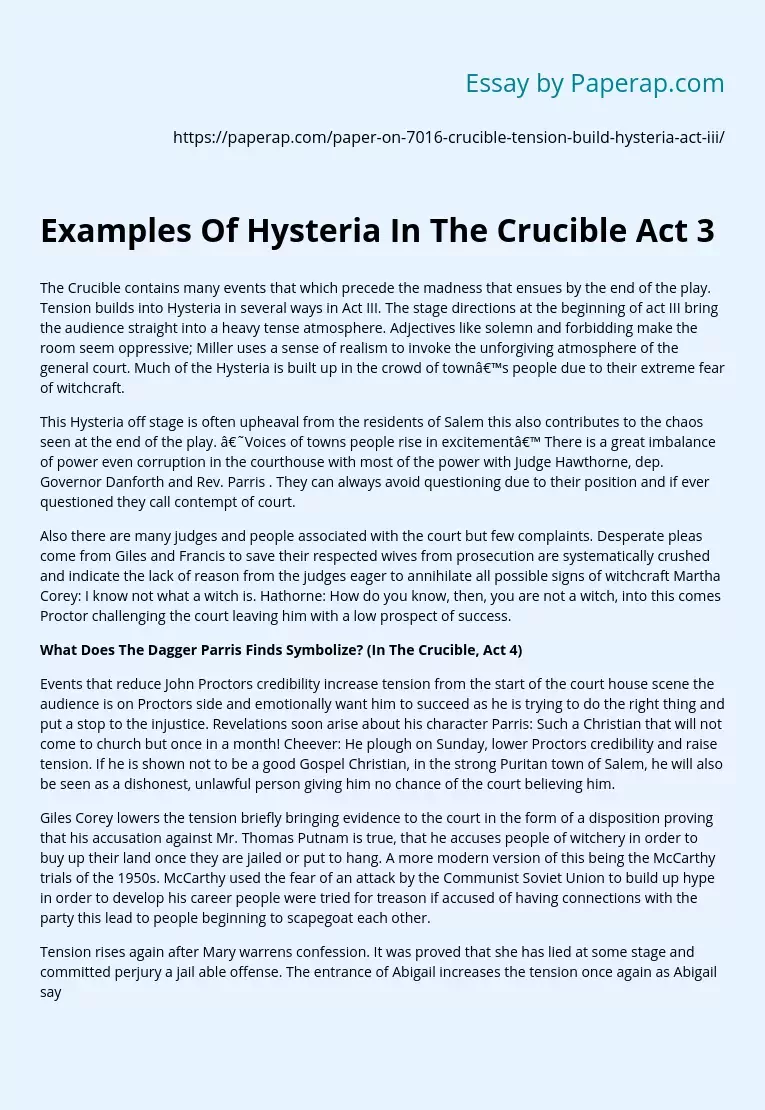Examples Of Hysteria In The Crucible Act 3
The Crucible contains many events that which precede the madness that ensues by the end of the play. Tension builds into Hysteria in several ways in Act III. The stage directions at the beginning of act III bring the audience straight into a heavy tense atmosphere. Adjectives like solemn and forbidding make the room seem oppressive; Miller uses a sense of realism to invoke the unforgiving atmosphere of the general court. Much of the Hysteria is built up in the crowd of town’s people due to their extreme fear of witchcraft.
This Hysteria off stage is often upheaval from the residents of Salem this also contributes to the chaos seen at the end of the play. ‘Voices of towns people rise in excitement’ There is a great imbalance of power even corruption in the courthouse with most of the power with Judge Hawthorne, dep. Governor Danforth and Rev. Parris . They can always avoid questioning due to their position and if ever questioned they call contempt of court.
Also there are many judges and people associated with the court but few complaints. Desperate pleas come from Giles and Francis to save their respected wives from prosecution are systematically crushed and indicate the lack of reason from the judges eager to annihilate all possible signs of witchcraft Martha Corey: I know not what a witch is. Hathorne: How do you know, then, you are not a witch, into this comes Proctor challenging the court leaving him with a low prospect of success.
What Does The Dagger Parris Finds Symbolize? (In The Crucible, Act 4)
Events that reduce John Proctors credibility increase tension from the start of the court house scene the audience is on Proctors side and emotionally want him to succeed as he is trying to do the right thing and put a stop to the injustice. Revelations soon arise about his character Parris: Such a Christian that will not come to church but once in a month! Cheever: He plough on Sunday, lower Proctors credibility and raise tension. If he is shown not to be a good Gospel Christian, in the strong Puritan town of Salem, he will also be seen as a dishonest, unlawful person giving him no chance of the court believing him.
Giles Corey lowers the tension briefly bringing evidence to the court in the form of a disposition proving that his accusation against Mr. Thomas Putnam is true, that he accuses people of witchery in order to buy up their land once they are jailed or put to hang. A more modern version of this being the McCarthy trials of the 1950s. McCarthy used the fear of an attack by the Communist Soviet Union to build up hype in order to develop his career people were tried for treason if accused of having connections with the party this lead to people beginning to scapegoat each other.
Tension rises again after Mary warrens confession. It was proved that she has lied at some stage and committed perjury a jail able offense. The entrance of Abigail increases the tension once again as Abigail says that Elizabeth Proctor keeps poppets meaning John’s wife may have used some sort of voodoo against Abigail because Abigail was found stabbed with a dagger along with a poppet with a needle in it seemingly making her appear evil lowering John’s credibility yet again.
What Abigail does is could quite easily seen as mob psychology, she manipulates the hysteria of the crowd to for fill her own desires she always manages to avoid questioning by saying nothing or not answering “If I must answer that, I will leave and I will not come back again” but in this case by turning the question around and warning even threatening Danforth when asked are the spirits she had been claiming to see were illusion only before claiming to see spirits in the room Let you beware Mr.
Danforth. Think you be so mighty that the power of hell may not turn your wits? When Proctor first enters the court he ‘speaks reasonably, restrained of all his fears, his anger his anxiety’ “I would ask you to remember, sir, while you read it, that until two weeks ago she were no different than the other children are today. ” however by this stage he has lost all of his composure he goes from making rational points to hysterical outbursts (breathless and in agony! ) ‘It is a whore!
” this is probably due to the fact he is putting his own neck on the line. At this stage the tension for the audience goes down as there is a chance that Abigail might get found out although John is near hysterical. John is questioned one final time about everything that has already been said before Elizabeth enters to answer whether or not Abigail had an affair with John not knowing John has already confessed to the General court to expose the truth this rises tension bringing it to a pinnacle either John or Abigail will be ruined at this point.
Elizabeth lies though, to save Johns reputation so he is not found to be an adulterer. Elizabeth is removed and for the second time Abigail claims to see spirits and from this point onwards there is sheer hysteria. At the very end Hale decides to quit the court after loosing his importance from when he arrived in Salem believing that there may be evil at work there to at the end of the scene where he believes Proctor and that the truth has become hazy at this point all John had fort for was lost.
Examples Of Hysteria In The Crucible Act 3. (2019, Dec 05). Retrieved from https://paperap.com/paper-on-7016-crucible-tension-build-hysteria-act-iii/

